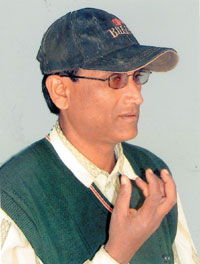 Jwala Singh, real name Nagendra Paswan, proves that you do not have to climb very high to become a powerful dalit in Nepal. In this case, the head of the most violent-but not the most important or largest-faction of the JTMM.
Jwala Singh, real name Nagendra Paswan, proves that you do not have to climb very high to become a powerful dalit in Nepal. In this case, the head of the most violent-but not the most important or largest-faction of the JTMM.
Recently we met Paswan in a bare hotel room off a muddy street in small-town Bihar, where everything he and his two companions had could fit into a small holdall. Out of consideration for his guests he left the room to smoke, though he had no compunction about spitting in the corner. He invited us to join him under blankets on the bed and passed around an old studio shot of himself, declining to be photographed as he currently appears.
Talking to Paswan is strikingly similar to speaking with a district level Maoist leader-albeit an especially friendly one-during the conflict. He reeled off the short list of killings and attacks he has commissioned with apparent indifference.
Paswan started out as a journalist, mainly for leftist publications. For a while he ran his own newspaper, and was vice-president of the Siraha chapter of the Federation of Nepalese Journalists for six years. Paswan then had a stint with the Maoists, splitting from them in 2004 over the appointment of Matrika Yadav as head of the Maoist-affiliated Tarai Mukti Morcha. He formed the JTMM with Jai Krishna Goit, notionally to fight for complete tarai independence. His early battles after going freelance were against his former comrades.
To hear Paswan tell it, it was not so much a repudiation of Maoist ideas that led to the split as a divergence of interests. He still talks about revolution coming from poverty and suppression. But, he says, "the Maoists didn't have a clear vision of madhesi rights. We don't want to be devotees or partners of pahadis. If we do that, there won't be any liberation of the tarai."
Paswan soon parted ways with Goit who, he says, "was already 80, always sick, he couldn't remember dates." Paswan says he broke away because "the tarai movement needed sacrifice and youth", and because it was what JTMM cadres wanted. According to one of his followers about 150 former Maoists are in the group, some with their original weapons. The JTMM-J says it has "full strength" in 13 districts and "agents" in five more.
The JTMM-J organised "some attacks and bandas" and during the tarai movement earlier this year hit at least three police posts, killing a policeman called "Karki something" Paswan recalls. The group lost some of its own people, including five in a single incident. By now, he says, "Our front has proved that we are brave and revolutionary."
Since mid-February, when the government invited madhesi groups for talks, Goit has not yet responded, and the Madhesi Janadhikar Forum's 'Uprendraji' is putting increasing pressure on the government. Paswan, who has the weakest profile of the three, immediately accepted the offer. He issued a list of nine demands, and added another the next day as if as an afterthought. The first demand is an independent tarai state, which he insists must run the length of the country. But the second, fair representation for madhesis in the military, politics and administration, suggests that the demand for independence is rhetorical.
"We believe in negotiations and negotiations are about give and take," Paswan explains. "If the government addresses these problems [of discrimination] and establishes a federal state with self-government, the negotiations might succeed." The JTMM-J is still waiting for their tarai rivals to follow before the talking can start.
Given his apparent urge for credibility, does Paswan intend to contest the constituent assembly election? "Yes, if negotiations succeed and madhesi rights are guaranteed. Our fight is for power and rights," he says, apparently to the surprise of the two boys sitting with him.
Paswan smoked another cigarette, explaining that he was under a lot of stress. We left the hotel together and he tramped off down the muddy street, with his two young followers and their little bag.


